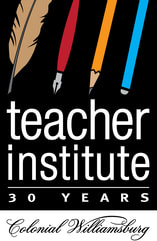How did Virginians evolve from British subjects to American citizens? That is a compelling question. I am not sure of the answer. The people living during the transition of British colonies to independent American states must have given pause to many, while at the same time inspiring others to rebellion. John Adams surmised that, during the Revolution, one-third of the people were Patriots, one-third British-loyal Tories, and one-third undecided. It would not have been easy to decide the right path with which to side. The outline for the week at the institute lists supporting questions for each day of programming: |
Why did England establish colonies? What was their purpose?
As the Jamestown colony expanded, how did the diversity of the populace both contribute to success and lead to conflict?
Why was Jamestown successful when other North American colonization attempts failed?
How do we know what we know about people who lived in the past?
How was Williamsburg a center of British government, commerce, and culture?
- How did the diversity of the Williamsburg populace both contribute to success and lead to conflict?
What role did Virginia and other North American colonies play in Britain’s economy?
- What was the importance of agriculture in colonial Virginia and how did it influence the institution of slavery?
How did eighteenth-century Williamsburg culture reflect the origins of Europeans, Africans, and American Indians living and working there?
How did daily life differ for the various social levels and groups?
Where and how did people from different social levels interact?
What caused American colonists to rebel against the most powerful country in the world?
What was the significant impact of Yorktown?
Were the members of the revolutionary generation founders or traitors?
What does it mean to be an American?
As citizens, what role do we have in carrying forward these ideals or changing them?








































